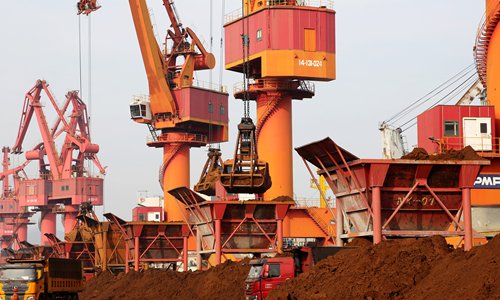Yuan-denominated iron ore trade on the rise, boosts China’s pricing influence
Source:Global Times Published: 2020/5/12 17:58:40

Cranes unload imported iron ore at the Lianyungang Port in East China's Jiangsu Province on Sunday. In September, the port's iron ore throughput exceeded 6.5 million tons, a new high for the year, making it a major port for iron ore imports in China. Photo: VCG
China Baowu Group, the world's largest iron and steel complex, completed a yuan-denominated, blockchain-technology-based transaction of more than 100 million yuan ($14 million) with Rio Tinto on Monday, a move signaling the rising influence of Chinese currency in pricing major commodities.
Baowu said that settling part of its massive iron ore purchases in yuan reflects its "operational needs" and meets the trend of the yuan's globalization trend.
"Such trade is attractive to multinational companies with an interest in long-term cooperation in the Chinese market," the company said on its WeChat account.
"The deal is a sign that the scale of yuan settlements is increasing in the iron ore trade, where China is heavily reliant on imports," said Wang Guoqing, research director at the Beijing Lange Steel Information Research Center.
Monday's transaction marked the completion of a trio of deals between Baowu and the world's top three iron ore suppliers. In January, Baowu completed its first yuan-denominated deal worth 330 million yuan with Vale, the world's largest iron ore supplier. That was followed by a 100 million yuan deal in April with BHP.
Chinese steel mills have been seeking more yuan-denominated deals instead of US dollar to avoid losses incurred from foreign exchange rate fluctuations.
HBIS Group, China's second-biggest steelmaker, completed its first such deal with Vale in a 200 million yuan contract in January, Reuters reported.
In October 2019, Rio Tinto sold its first yuan-denominated shipment to a steel mill in North China's Shanxi Province.
Mi Pengqi, a senior analyst at commodity information site 315i.com, said that further use of the yuan will continue to tilt the scale toward Chinese steel mills in terms of pricing influence in the global iron ore trade.
"China's demand for iron ore has reached a plateau but remains significant, and Chinese buyers already stand a 50-50 chance of influencing the pricing power of foreign iron ore suppliers in any given situation," Mi told the Global Times on Tuesday. "Such a trend will continue in the future alongside the yuan's continued globalization."
Standard Chartered issued a blockchain-technology-powered letter of credit for the Baowu-Rio Tinto deal, which the bank said was the world's first such certificate pegged with offshore yuan.
The use of blockchain technology - a digital public ledger of transactions that has seen increased usage in the global commodity trade - helped facilitate the trade and reduced costs for all parties involved in the transaction, Wang told the Global Times on Tuesday.
Posted in: COMPANIES